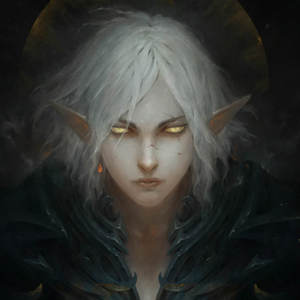As the afternoon grew late, and Lavellan families sat down to eat their evening meals in the growing suspense that filled the city of Chaverne, Caden Sarka walked quietly through the halls of the chateau. A member of the black-armoured kingsuard stood by the walls every few paces, and at each side of every inward-leading door, but other than their standing to attention as Caden passed them he was alone and unheeded.
It was uncanny how much the Lavellan palace reminded Caden so much of his home. It was well furnished; with wooden floors, soft blue walls and dozens of tables and chairs lining each edge of whichever corridor he chose to walk in. The walls were covered with painted art brought to life by the most talented artists in the southern realms, depicting historical events and portraits of those who had become worthy of note, or simply had the fortune to live in a house of wealth and nobility.
One such painting caused Caden to stop, turn and examine it closely – a portrait of a man at the very height of his life, wearing shining steel armour and a beautiful cloak of white fur with blue trimmings. The man’s armoured foot was on the back of a giant, speared boar, and above his high cheek bones he wore a golden crown. “King Gabriel IV,” Caden read aloud. “Also known as the Great King Gabriel.”
King Gabriel IV had been Armand’s father, and had died when Caden was eleven years old, but what caught Caden’s eye was not the majesty of the man depicted but a small message in gold, carefully penned in the bottom corner.
‘King Armand, may this painting be in honour of your great and noble father. Signed, King Valen II of Sarkana.’
Caden closed his eyes and took in through his nose a deep breath that held back a well of feelings. He waited a few seconds before opening them again, then turned and walked away.
He continued down the hall until a guard opened a pair of wooden doors at the end of it, and he stepped through to find he could now go either left or right. To the left he saw a kitchen, and staff working to prepare an evening meal, and to the right he saw further doors and turns. He went that way, then turned left again until he came to a rear set of stairs that climbed up to the next floor in 90-degree turns. At the foot of those stairs, and on the opposite side of the corridor, two guards stood watch either side a single unassuming door with Arian waiting nearby.
“Is he inside?” Caden asked his brother, who turned to greet him with a nod.
“He is,” Arian said, unable to help himself looking at Caden’s unnaturally white eyes. “He’s waiting for you.”
“Thank you for doing what you did, Arian.”
“There’s no need. I understand why.”
Caden smirked a little, then gave Arian an easy pat on the shoulder as he walked past. “I’ll talk to you later, brother,” he said, stopping outside the door with his hand hovering over the brass knob.
“I can stay here if you like,” Arian suggested.
“There’s no need.”
Caden opened the door and stepped inside, then carefully and quietly shut the door behind him. When he turned back into the room he found a small library, barely a reading room, consisting of bookshelf-lined walls and two comfortable armchairs by a log fire with a small square table between them.
In one of the chairs sat King Armand, who until Caden entered had been gazing into the slowly flickering flames. The room had a warm and relaxing atmosphere, ‘homely’ almost, and the flames danced slowly like fair maidens. But when Armand looked up to see Caden standing there silently, his face illuminated in fire’s light and his eyes a deathly colour, the King of Lavell jumped and flinched in fright.
“Prince Caden,” Armand said, taken aback. “I am glad to see you well.”
“I will soon be King Caden,” he explained flatly, walking towards the fire and then around the empty chair to take a seat in it.
Caden’s ploy had worked. Armand was unsteady, unsure; as though he was seeing a dead man walking. Perhaps Caden was a dead man walking. “We believed you had died to Alaric’s dagger. Though… There were rumours…”
“Men like us should know not to take credence from rumours, King Armand,” Caden said, leaning back comfortably and looking into the fire.
“Perhaps not,” Armand replied. He was slowly calming, though still confused and unsettled, by Caden’s ice-white eyes. They had been green before, hadn’t they? He was sure of it.
Caden wanted to smile but did not let himself. He pressed on, wanting to gain as much ground as possible before Armand caught on to what he was doing. “Let us talk about why we are really here, Armand. You were beaten, your army routed from the field. You have lost this war.”
Armand closed his eyes. “You have won a victory, it is true. Yet I wonder if it can truly be said that Lavell has lost when so many of our men are still willing to take up arms to defend her? To drive out the invaders?”
“There is no chance of that happening now, Armand,” Caden answered calmly. “We have you, we have Chaverne, we have its nobles and people. We have your daughter.”
“Really?” Armand asked, rebutting. “You may occupy these walls, but it is we of Lavell who built them, who know them. We may be trapped here, but so are you.”
Caden glanced across at the older man, now noticing how his cheeks had grown a little thinner in the previous fourteen days. He had looked thin before the battle, but now he looked ill. “You should eat, King Armand. We would not want you to die before our negotiations are concluded.”
“No,” he chuckled. “You would not. Not until after them, at least.”
“You should not jest,” said Caden. “There are still ways we might find peace.” His concern was feigned, but it no longer mattered. Armand was right where Caden wanted him; defeated, too unnerved by Caden’s presence and overwhelmed by what it meant to be his usual cocksure self. Whether he realized it or not, Armand was being carefully herded into a corner that both knew only had one exit…
“And what ways would they be?” Asked Armand. “Your marriage to my daughter?”
If Caden could have found enough time to smile in secret, he would have. “To your daughter?” He repeated, as though he had not particularly considered that an option.
“Do not play coy, Caden. That is a peace that would satisfy us both, is it not? You would have your victory over me, over my daughter… And Lavell would have its survival.”
And just like that, Caden saw his victory. His father’s victory. Armand would never have offered such a thing were his demeanour in better condition, and now he had been stripped of the opportunity to delay and skirt and freely plot without such an agreement hanging over him.
“It would satisfy us both,” Caden agreed. “I have yet to marry, and it would be advantageous for both me and your daughter. Tell me, Armand, how is Jaqueline? I must have been no older than fifteen when I last saw her.”
“She has grown into a fine young woman, I must admit. Many noble sons have sought her hand.”
“And yet she remains unwed?”
Armand gave a slight shrug. “When Jean died, I became very protective of her. It is why she remains here in the chateau, and not in her summer Palais de Fleur. You can meet with her this very evening, should you wish to do so.”
Caden sat up a little. “I would,” he said. “If it is truly your intention to find peace between our lands through the joining of our houses in matrimony.”
“Save your flowery words for public speaking, Caden,” said Armand. “Right now, we speak as two kings, with none around to hear us but each other. I will not sign a contract now, not until all details have been agreed upon in further negotiation. But yes, let us proceed as though it will be signed.”
After Armand finished speaking, Caden fell silent and looked into the flames. They danced carefully, soft wisps of smoke rising into the brick chimney and coals glowing a searing orange beneath them. He stared; the warmth making his eyes heavy, the flames contorting in his tiny black pupils, the heat warping into shapes and figures until suddenly a pale, feminine face looked back at him with black eyes. He blinked quickly, and then it was gone.
“You will be allowed to roam the chateau freely,” Caden told Armand, “though you will be under guard. If you wish for a private audience with your daughter, or another you have valid reason to see alone, my guards will wait outside until you are finished.”
Armand nodded, though said nothing more. Caden stood then and turned towards the closed door with a sudden growing urge to escape the room. Those black eyes, those tricks of the mind, now haunted him to where he feared to look at the shadows, and Armand’s silence was becoming deafening. With each passing moment he feared it might be broken by an unnatural scream, so Caden took hold of the doorknob and twisted it urgently. “Good evening, King Armand,” Caden told him, then opened the door and left.











Comments (0)
See all